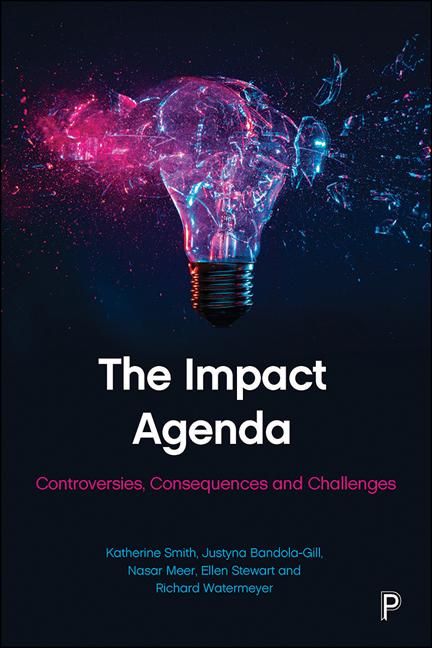Book contents
- Frontmatter
- Contents
- List of figures, tables and boxes
- List of abbreviations
- Notes on authors
- Acknowledgements
- 1 Introduction: Critical Reflections on Research Impact
- 2 The Rise of Research Impact
- 3 Debating the UK Impact Agenda
- 4 Do Experiences and Perceptions of Research Impact Vary by Discipline?
- 5 Impact on whom? Contrasting Research Impact with Public Engagement
- 6 Public Intellectualism and the Impact Agenda: International Perspectives
- 7 Academic Life in the Impact Vanguard: The View from Knowledge Exchange Organisations
- 8 Looking Back: Evolving Public Health Perspectives on Research Impact
- 9 Telling Tales of Impact: As Seen Through the Eyes of User Assessors
- 10 Conclusion: What Would an Evidence-Informed Impact Agenda Involve?
- References
- Index
8 - Looking Back: Evolving Public Health Perspectives on Research Impact
Published online by Cambridge University Press: 23 February 2021
- Frontmatter
- Contents
- List of figures, tables and boxes
- List of abbreviations
- Notes on authors
- Acknowledgements
- 1 Introduction: Critical Reflections on Research Impact
- 2 The Rise of Research Impact
- 3 Debating the UK Impact Agenda
- 4 Do Experiences and Perceptions of Research Impact Vary by Discipline?
- 5 Impact on whom? Contrasting Research Impact with Public Engagement
- 6 Public Intellectualism and the Impact Agenda: International Perspectives
- 7 Academic Life in the Impact Vanguard: The View from Knowledge Exchange Organisations
- 8 Looking Back: Evolving Public Health Perspectives on Research Impact
- 9 Telling Tales of Impact: As Seen Through the Eyes of User Assessors
- 10 Conclusion: What Would an Evidence-Informed Impact Agenda Involve?
- References
- Index
Summary
As we have seen, for some academics, commitments to research impact represent a disturbing set of practices designed to draw boundaries around what constitutes ‘legitimate’ academic work in ways that reify apolitical, policy-driven research while silencing more critical voices (e.g. Slater, 2012). This, in turn, has fuelled concerns that efforts to promote research impact in the UK are, in effect, directing researchers towards the production of ‘policy-based evidence’ (Cohen, 2000; Hammersley, 2005; Slater, 2012). These concerns have, however, been less evident in public health than many other areas of academia, with senior public health researchers often arguing (as we saw in Chapter 4 and 7) that a stronger relationship between research and policy is desirable and that this is likely to be achieved through closer working relationships between researchers and policymakers (e.g. Hunter, 2009; Whitehead et al, 2004; Wimbush et al, 2005). However, the failure to achieve key public health goals in the UK, such as a substantial reduction in health inequalities, despite efforts by researchers and policymakers to work more closely together, has prompted questions about this relationship and about the quality, focus and/or utility of available research (Mackenbach, 2011).
In this chapter, we begin by briefly reviewing two key studies exploring the relationship between evidence and policy for the longstanding public health concern with the cross-cutting challenge of reducing health inequalities in the UK, both of which included policymakers as research participants. These papers suggest that policymakers concerned with public health and health inequalities in the UK put forward relatively consistent proposals for improving the use of research in policy across both studies, despite a publication gap of nearly a decade. Next, the chapter compares the views of public health academics interviewed in 2003– 7, the run-up to the RAE in 2008 (before the emergence of research impact) with the views of academics working in the same field in 2011– 15, who experienced REF2014 and the first attempt to assess impact case studies (additionally making brief reference to the perspective of interviewees based in policy organisations). This comparison shows that, in this relatively applied research field, an initial scepticism about the likely influence of efforts to promote and reward research impact gave way to a diversity of views, stretching from enthusiastic support (for academics who feel far more enabled to undertake external-facing work than they once did) to pragmatic acceptance.
- Type
- Chapter
- Information
- The Impact AgendaControversies, Consequences and Challenges, pp. 161 - 182Publisher: Bristol University PressPrint publication year: 2020



